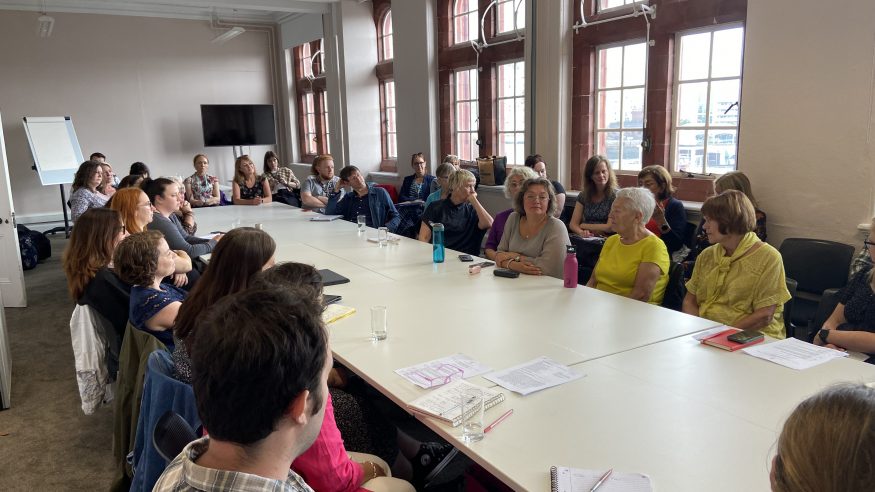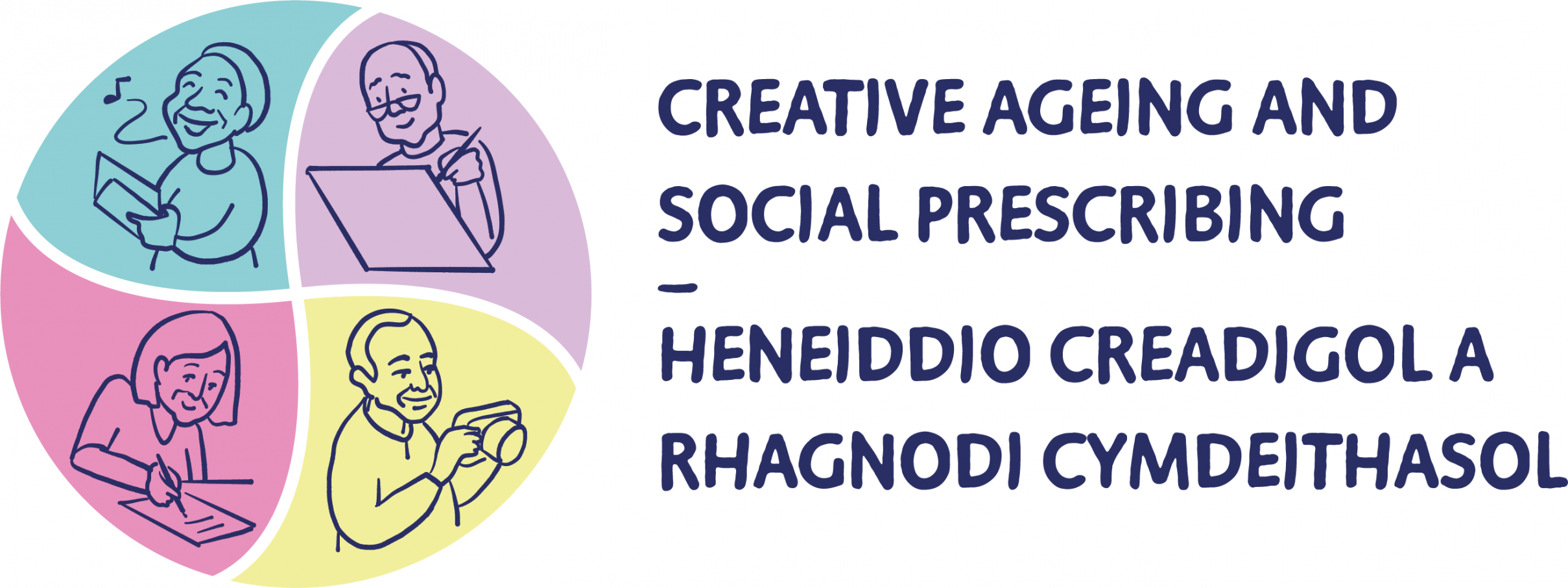Policy engagement event: presentation to the Senedd Arts and Health Cross Party Group
28 July 2023
The Creative Ageing and Social Prescribing project team members presented their work to policy makers from the Welsh Government during the Arts and Health Cross Party Group Meeting that took place on 11 July 2023 at the Pierhead Building.
The meeting was chaired by Jayne Bryant, Member of Senedd and attended by Senedd staff members, arts and health co-ordinators and professionals in arts and health.
Project representatives included Sofia Vougioukalou (Cardiff University, project lead), by Sally Lewis (Arts Council Wales, lead external partner), collaborators Johan Skre, (Swansea Bay UHB), Cath Harrison (Pride Cymru), Suzy West (Impelo), Juls Benson & Kiri Evans (Reality Theatre), Amal Beyrouty (Women Connect First), Sarah Teagle & Katherine Harri (Forget me not chorus), public involvement participants Karen Cox, Kalpana Natarajan, Mal O’Donnell, and film actors Aleona Saunders, Tatiana Zagorodnya & Olga Zagorodnya.
In this meeting Sofia provided an update and overview of the British Academy-funded research project she was undertaking with partner organisations that aimed to explore and identify the barriers to accessing Social Prescribing for older people who experience social isolation and/or dementia from minoritised and under-represented communities. 10 case studies underpinned the research project and this was supplemented by a wider service mapping exercise as well as 5 x thematic focus groups.
Key themes needing further consideration:
- The arts and health service interface: wellbeing vs social prescribing
- Inclusion and safety in arts and health: do we need to create safe or brave spaces?
- Open vs closed membership in creative group activities
- Arts for wellbeing vs skills-based training
- Evaluating and communicating impact
Key issues emerging included the need to tailor the offer and connect older people to a suitable cultural offer; there was limited knowledge of the minoritised older person’s perspective and how to best inform policy in this area. Often cultural and recreational activities with one’s peers within their specific demographic category had the biggest impact on mental health and wellbeing. Isolated older people can go for long periods without speaking to anyone. Older people with dementia are living longer and need to be supported in the community to avoid unnecessary hospitalisation which might lead to deconditioning. Sofia was now working with partners including those in the Public Involvement Group to apply the policy recommendations.
Various project participant groups then shared practical examples of creative projects being delivered with older people and minoritised groups:
Forget Me Not chorus (Sarah Teagle)
The Forget Me Not Chorus started 12 years ago and works in the community and in care homes and hospitals using the power of song to improve people’s quality of life. FMNC’s main hub is in south Wales. 22 in-person sessions take place every week2, reaching some 500 people. In addition, a pre-recorded online library of singing sessions can be accessed as well as the online zoom choir. All of FMNC’s work is free at the point of access with some care homes buying a package of singing sessions for their residents. The 30 strong, trained music team work to deliver the charity’s mission of empowering those impacted by dementia. The approach avoids using song sheets which can disadvantage non-music readers and regards everyone first and foremost as a singer. Shared song is used as a tool for communication not just for reminisce. Members are challenged to learn new pieces as well as enjoy music that is familiar to them. The sessions focus on uplifting participants and provide a respite from the devastating effects of dementia. The FMVC has also set up Calon Chorus, the first choir in Wales made up of people who have lost loved ones to dementia. FMNC maintains strong partnerships with WNO, RWCMD and Cardiff Singer of the World and the Alzheimer’s society. Public performances help to amplify the participants’ voices.
Impelo (Suzy West)
Impelo is a dance company based in rural mid-Wales who have been working with isolated older people living outside of care homes in partnership with Dementia Matters Powys. They have developed bespoke dance sessions with a physiotherapist to ensure the activity is safe for a group that is at a high risk for falls. The focus is on creative movement and touch which the participants find to be a welcome change from everyday functional movement.
Golden years project, Women Connect First – (Amal Beyrouty)
The aim of this project is to bring ethnic minority women together to connect and learn together. Lockdown and the need to develop online skills and connect digitally was the original impetus for the project. 40 women started the training and this soon grew to 180 leading to a sense of much greater inclusion and social connection for the women. The Golden Year project has 214 members drawn from 30 diverse ethnic backgrounds and ages span from 50-87 years. The most common health problems within the group were arthritis, mobility issues and mental health issues which can compound a sense of isolation as do language barriers and social economic barriers.
Pride Cymru (Cath Harrison)
Pride Cymru is a volunteer-led charity that works to promote the elimination of discrimination be it on the grounds of sexual orientation, gender, race, religion or ability. They are committed to recognising and celebrating the contributions made by LGBT+ people in society and they continue our work to create opportunities for LGBT+ people around Wales to connect and support each other. Each year, their annual festival draws thousands of people to Cardiff City Centre to take part in the parade and two day musical festival. The festival site includes a raised accessible viewing platform, accessible toilet facilities and a quiet space and carers can also request complimentary passes.
Reality Theatre screened their short film ‘The Person I Used to Be’ based on research findings from this project which prompted a rich discussion around the issues raised.
The meeting ended discussing policy recommendations on increasing and diversifying participation in social prescribing in Wales.
